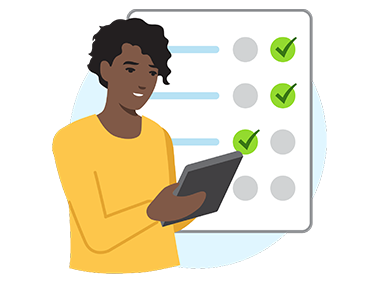Your Medicaid renewal guide
Most people need to reapply for Medicaid each year. Learn how Medicaid renewal works to avoid losing your coverage.
Medicaid renewal at a glance
If you or your family get Medicaid or Children’s Health Insurance Program (CHIP) benefits, you may need to renew your coverage every year. This renewal process is sometimes called redetermination or recertification. During renewal, your state’s Medicaid office will check your information to see if you’re still eligible.
Here’s what you need to know to stay covered, and what to do if you no longer qualify.

Find out how to renew your coverage in your state
Medicaid renewal is a little different in every state. It’s important to know what information your state needs from you. To stay covered, review your state’s requirements.
How do I renew my Medicaid coverage?
Your state Medicaid office will review your information to see if you or your family still qualify. If you meet the requirements, you might not have to fill out any forms.
It’s also possible your state may need more information to see if you qualify. If they do, they’ll mail you a letter.1 This letter will let you know if you need to complete a renewal form and how much time you have to respond to it. You’ll want to send your state the renewal form and any documents they request right away. That way, you can avoid a gap in your coverage.
What should I do if I don’t get a renewal letter?
If you think you should have gotten a letter but you haven’t, contact your state Medicaid office.
What information will my state ask me for?
Your state will tell you what information they need from you. They might ask for:
- Proof of citizenship for any new members of your household
- The most recent pay stubs for anyone who works
- Proof of any income you receive other than wages
- If you stopped working, proof that your job ended
Do I have to renew my Medicaid every year?
It varies by state, but most states ask you to renew your benefits every year.
If you qualify for Medicaid and Medicare, you’re considered “dual eligible.” Dual Eligible Special Needs Plans (D-SNPs) are a type of Medicare Advantage plan for people who get Medicare and Medicaid benefits. You need to have Medicaid coverage to qualify for a D-SNP.
If you qualify for a D-SNP, you may get extra benefits and have lower costs when compared to original Medicare.
You may need to renew your Medicaid coverage if you're dual eligible and get D-SNP benefits. If you don’t qualify for Medicaid, you’ll need to choose a different Medicare plan.
What should I do if my Medicaid coverage ends?
If you think your state made a mistake, you can appeal their decision. Your state must allow you to ask for a fair hearing about a denial.2 Each state has a different appeal process, so check your state’s rules before starting an appeal.
Stay covered
If you no longer qualify for Medicaid, you still have options. You might be able to buy a health plan through a health benefit exchange, get coverage through your employer, or continue your coverage with Kaiser Permanente.

2“Understanding Medicaid Fair Hearings,” Medicaid.gov, March 2024, accessed on May 20, 2024.
